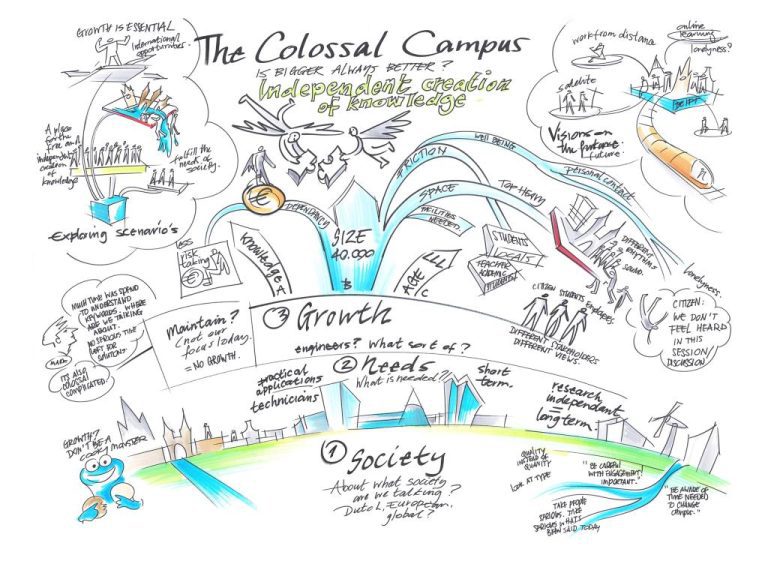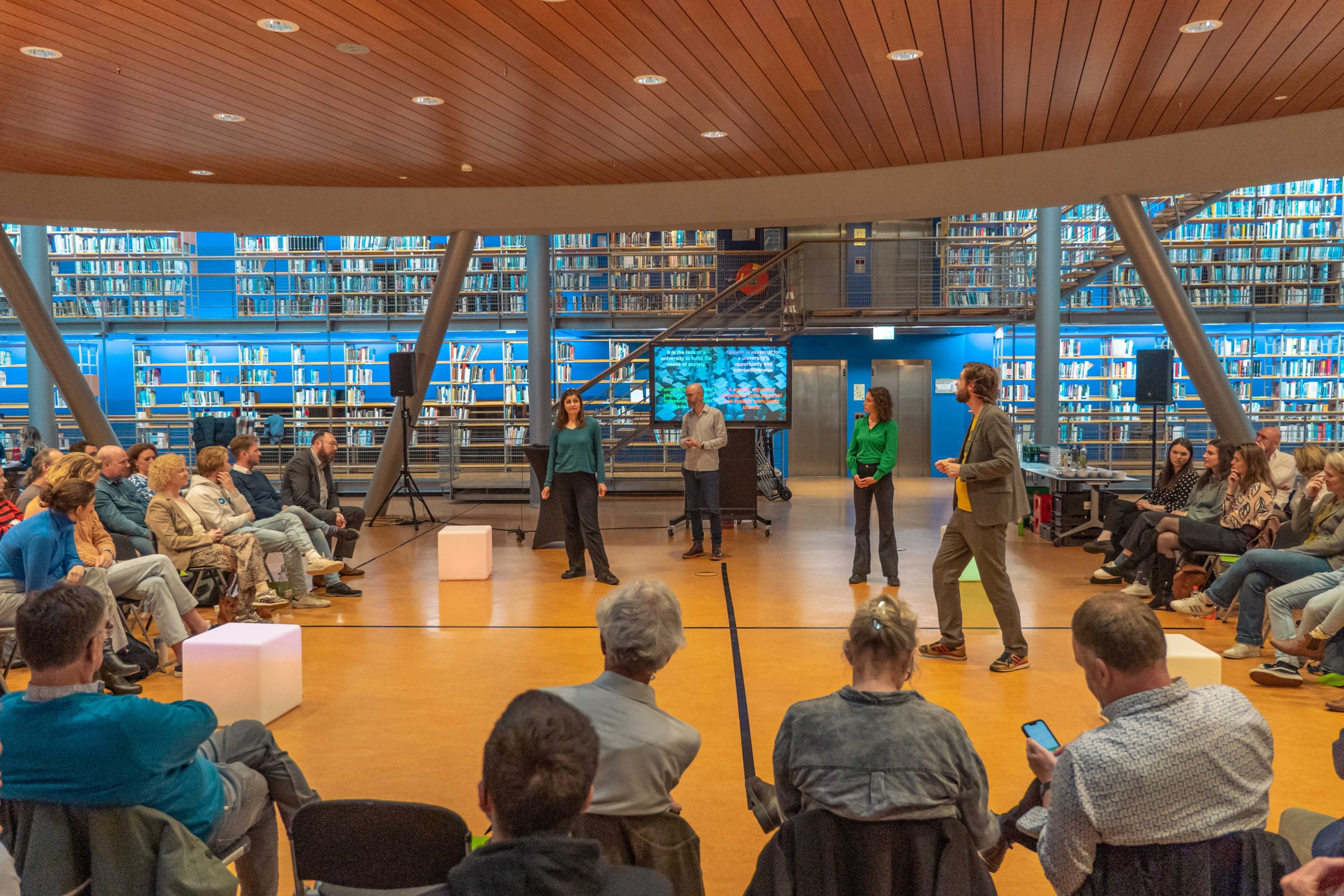A theatrical dialogue on TU Delft’s growth plans on Tuesday brought tension between students and residents. “It clearly shows how important TU Delft considers residents.”
At ‘The Colossal Campos’ event, actors depicted the audience’s opinions. (Photo: Thijs van Reeuwijk)
The Executive Board believes that TU Delft will need to grow significantly in the years to come. The multi-campus strategy currently under consideration in which teaching will also be given in Rotterdam and The Hague on top of the current campus, should enable a growth from 28,000 to 40,000 students. Starting in September, the Executive Board will hold ‘open meetings’ with staff members and students. The Public Lecture Series and Delta did not want to wait for this and organised a meeting on ‘The Colossal Campus: Is bigger always better?’ on Tuesday evening. A theatrical dialogue would be the first opportunity ‘in which students, staff members and people in Delft could discuss the issue together’.
Director Frank Kupper, researcher and actor at the Free University Athena Institute, designed the theatrical dialogue. His aim was to ‘free the imaginations’ of those present. Three actors took on the roles of students, teachers, administrators, residents and others. They acted out various scenarios related to the growth from these positions. The public and a panel of experts could then critique the scenarios after which the actors again acted them out in line with information and opinions raised.
The panel of experts consisted of: Remco Breuker, Professor of Korea Studies at the University of Leiden; Claudia Werker, Professor of Economics of Technology and Innovation at TU Delft; Marten Leenders, Chair of the Central Student Council; and Julian Gommers, a resident of Delft. Together they have experience of the different perspectives that were likely to emerge.
Free and independent
As the only person not connected to TU Delft or the city of Delft on the panel, Breuker presented a position statement. As he had previously said in an interview with Delta, he believes that many universities in the Netherlands have become too big and he is not in favour of further growth. He is afraid that growth will put the independence of the universities on shaky ground. The public seems to agree with him. When Kupper asks everyone to choose the statement that most closely reflects their views, the large majority say that “a university should first and foremost be a place for the free and independent creation of knowledge”. Some are of the opinion that universities must meet the needs of society or that small universities have a more personal and liveable climate. No one supports the statement that growth is essential in promoting opportunities and the competitive advantage of universities.
When the audience is asked to list some benefits of growth, silence falls
In the rest of the dialogue, it appeared that most of the people present were broadly in agreement with each other. When the audience discusses the statements with the people around them, there were mostly assenting nods. Not everyone is against growth, but people do see risks. When Kupper asks the audience to list some benefits of growth, silence falls.
Disagreement
One clear area of disagreement is between students and the residents present. At several points during the dialogue, the latter draw attention to the impact of growing student numbers on the rest of the city. After one-and-a-half hours, resident Sonja Sint has had enough. She takes the floor to draw further attention to the position of the residents. “We’ve been here for one-and-a-half hours upon invitation. Up to now everything has been internal. We residents of Delft have another issue and that is that we have only had the opportunity to say anything in the last 20 minutes. We have described exactly how we feel and how important the people of Delft are. The fact that we’re sitting here as citizens of Delft but don’t have a say and are not involved, but just get to watch, perfectly demonstrates the relationship that the people of Delft have with TU Delft.”
This interruption goes against the grain of Laura Tangelder, an Architecture and the Built Environment student. “You speak in the ‘we’ form, like you are the only ones. But there are teachers here too, and students. This is a public event which anyone can attend, and I think your tone is really very disrespectful.” Her comment gets the applause of at least two other students.
After the last part of the meeting in which the discussion looks at the relationship between students and the city in greater depth, Tangelder explains why she intervened. “This is a public event so it is important that everyone feels safe to speak freely. The anger that you felt building up all evening exploded and I just had to say something. I understand their position, but I do not think this is the right platform. Maybe it was a miscommunication.”
Misunderstanding
Another resident, Dannie van Seters, who came with Sint to the dialogue, also believes that the frustration was caused by a misunderstanding. “We were not one of the target groups. We misunderstood this. So make sure that you communicate properly. And make sure that there is involvement. There is a need among the residents to interact on this issue. You read in the news that there has been no interaction with the neighbourhood so you automatically think that TU Delft is steaming ahead with the plan and that it will be a done deal. This is not desirable, you need to discuss it.”
‘Residents had to worm their way in to be heard’
Jelle Knibbe, master’s student of Civil Engineering, agrees with him. “When they (the Executive Board, Eds.) announced the growth, they had not discussed anything with the residents. The residents had to worm their way in to be heard. I think this is wrong. The city is the environment in which TU Delft operates. If you take, or appear to take, these kinds of decisions without considering Delft and its residents as important stakeholders, you are making a huge mistake. You will only create tension and this is what we witnessed here.”
Signal
Leon Heuts, Head of the Public Lecture Series that co-organised the event, found the evening interesting. “There was clearly a lot of disquiet. The evening was not intended to be a public consultation, though this was what it was thought to be. This too is a signal. The residents believe that they have little say in the matter. This caused a degree of tension that was not always pleasant – but not everything needs to be pleasant all the time.”
So was the evening successful? “As an event, yes. In terms of format I need to think about it. The actors did a great job, but when there are a lot of emotions at play, we need to see how we can arrange the format differently.”
Present at the theatre dialogue was illustrator Mark van Huystee. He summarised the evening this way:
 (Illustration: Mark van Huystee)
(Illustration: Mark van Huystee)
Do you have a question or comment about this article?
E.S.Beinema@tudelft.nl


Comments are closed.